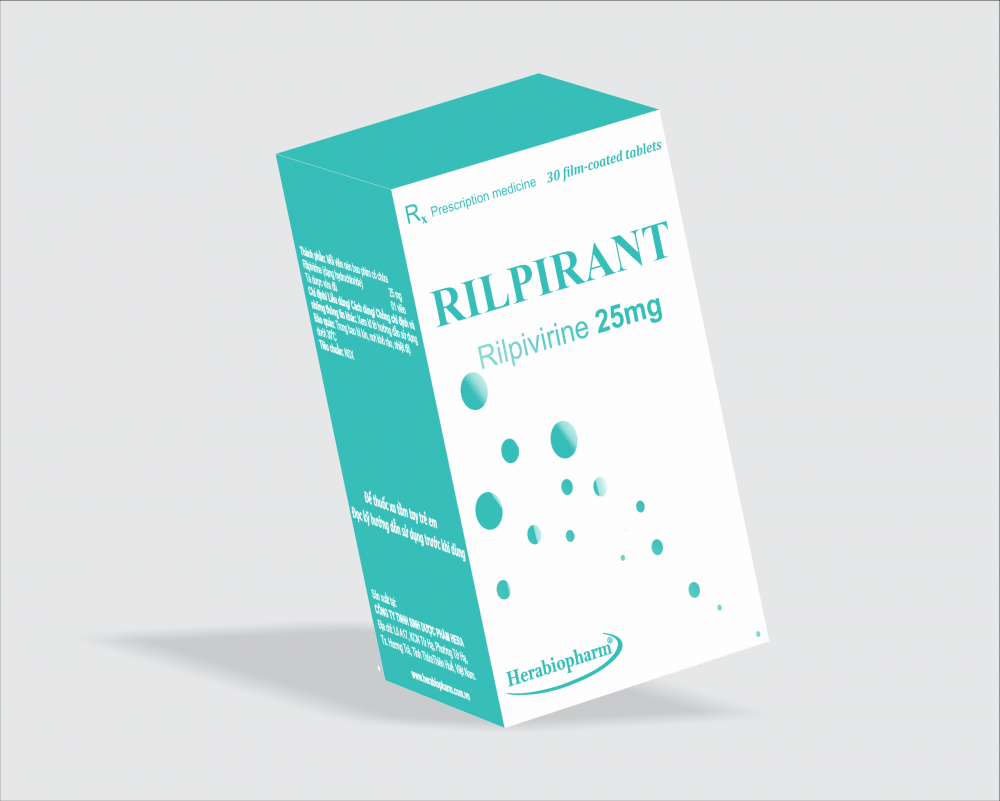Indications, posology and method of administration
THERAPEUTIC INDICATIONS
In combination with other antiretroviral medicinal products, is indicated for the treatment of human immunodeficiency virus type 1 (HIV-1) infection in antiretroviral treatment-naive patients 12 years of age and older with a viral load ≤ 100,000 HIV-1 RNA copies/ml.
Genotypic resistance testing should guide the use of rilpivirine.
POSOLOGY AND METHOD OF ADMINISTRATION
Therapy should be initiated by a physician experienced in the management of HIV infection.
Posology:
The recommended dose of rilpivirine is one 25 mg tablet taken once daily. Rilpivirine must be taken with a meal.
Dose adjustment:
For patients concomitantly receiving rifabutin, the rilpivirine dose should be increased to 50 mg (two tablets of 25 mg each) taken once daily. When rifabutin co-administration is stopped, the rilpivirine dose should be decreased to 25 mg once daily.
Missed dose:
If the patient misses a dose of rilpivirine within 12 hours of the time it is usually taken, the patient must take the medicine with a meal as soon as possible and resume the normal dosing schedule. If a patient misses a dose of rilpivirine by more than 12 hours, the patient should not take the missed dose, but resume the usual dosing schedule.
If a patient vomits within 4 hours of taking the medicine, another rilpivirine tablet should be taken with a meal. If a patient vomits more than 4 hours after taking the medicine, the patient does not need to take another dose of rilpivirine until the next regularly scheduled dose.
Special populations:
Elderly:
There is limited information regarding the use of rilpivirine in patients > 65 years of age. No dose adjustment of rilpivirine is required in older patients. Rilpivirine should be used with caution in this population.
Renal impairment:
Rilpivirine has mainly been studied in patients with normal renal function. No dose adjustment of rilpivirine is required in patients with mild or moderate renal impairment. In patients with severe renal impairment or end-stage renal disease, rilpivirine should be used with caution. In patients with severe renal impairment or end-stage renal disease, the combination of rilpivirine with a strong CYP3A inhibitor (e.g., ritonavir-boosted HIV protease inhibitor) should only be used if the benefit outweighs the risk.
Treatment with rilpivirine resulted in an early small increase of mean serum creatinine levels which remained stable over time and is not considered clinically relevant.
Hepatic impairment:
There is limited information regarding the use of rilpivirine in patients with mild or moderate hepatic impairment (Child-Pugh score A or B). No dose adjustment of rilpivirine is required in patients with mild or moderate hepatic impairment. Rilpivirine should be used with caution in patients with moderate hepatic impairment. Rilpivirine has not been studied in patients with severe hepatic impairment (Child-Pugh score C). Therefore, rilpivirine is not recommended in patients with severe hepatic impairment.
Paediatric population:
The safety and efficacy of rilpivirine in children aged < 12 years have not yet been established.
Pregnancy:
Lower exposures of rilpivirine were observed during pregnancy, therefore viral load should be monitored closely. Alternatively, switching to another ART regimen could be considered.
Method of administration
Rilpivirine must be taken orally, once daily with a meal. It is recommended that the film-coated tablet be swallowed whole with water and not be chewed or crushed.
CONTRAINDICATIONS
- Hypersensitivity to the active substance or to any of the excipients.
Rilpivirine should not be co-administered with the following medicinal products, as significant decreases in rilpivirine plasma concentrations may occur (due to CYP3A enzyme induction or gastric pH increase), which may result in loss of therapeutic effect of rilpivirine:
+ The anticonvulsants: carbamazepine, oxcarbazepine, phenobarbital, phenytoin.
+ The antimycobacterials: rifampicin, rifapentine.
+ Proton pump inhibitors: omeprazole, esomeprazole, lansoprazole, pantoprazole.
+ The systemic glucocorticoid: dexamethasone, except as a single dose treatment.
+ St John's wort (Hypericum perforatum).
